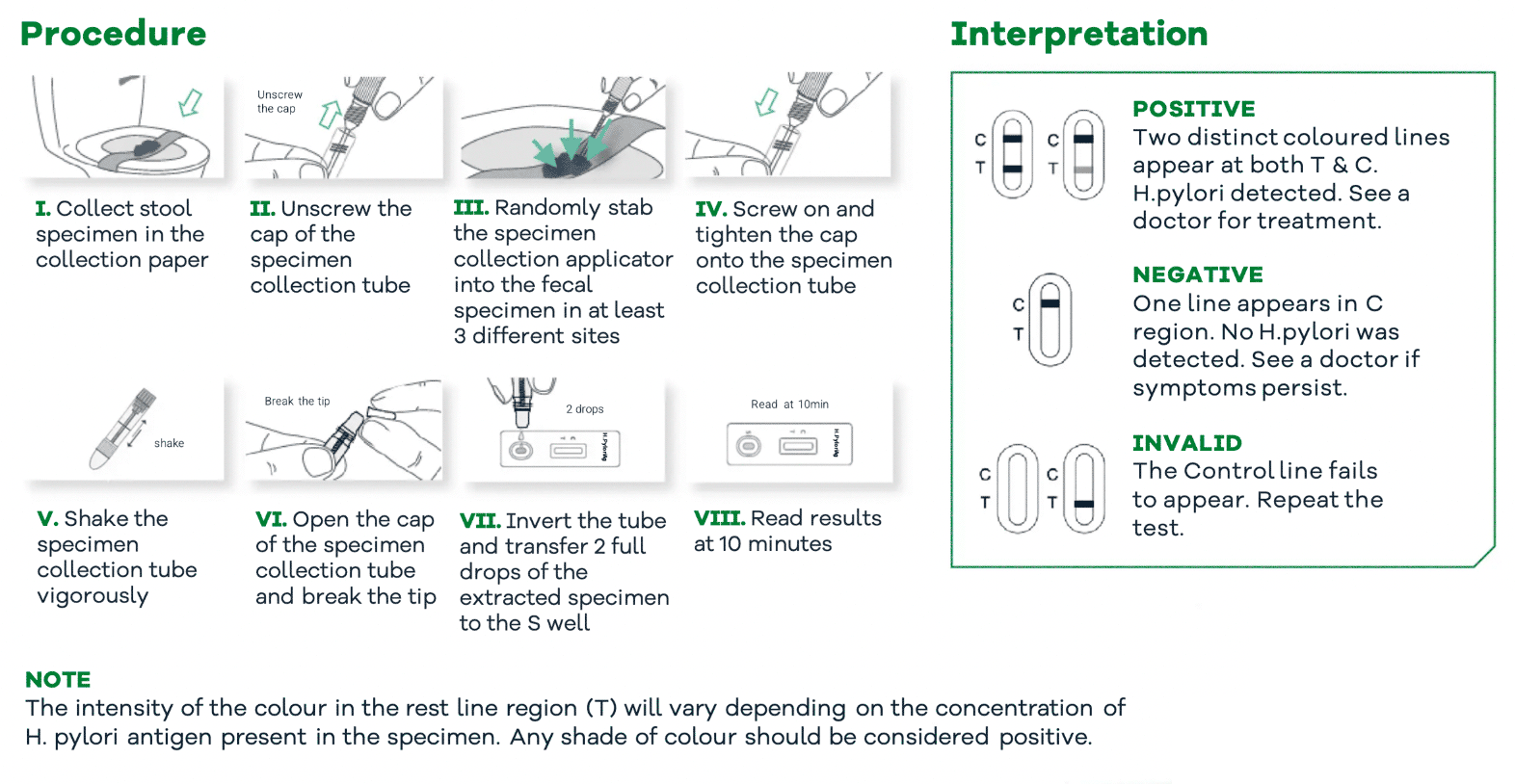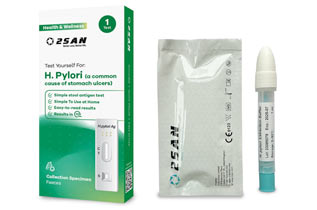H. pylori test
Check for H. pylori (Helicobacter pylori), a common cause of stomach ulcers and reflux symptoms in just 10 minutes with this reliable, easy to use, at home test available to buy online from Dr Fox.
Start orderBuy H. pylori test online in UK
How to order H. pylori home test from our online pharmacy for UK delivery:
- Read medical information about acid reflux treatment
- Answer medical questions to check for eligibility
- Order reviewed by doctors - posted from UK pharmacy (Royal Mail Tracked 24)
Prices
| Item | Quantity | Cost |
|---|---|---|
| H. Pylori test | 1 home test kit | £7.90 |
Prescription fees
Dr Fox supplies medicine on prescription and charges a small prescription fee based on the order value of each prescription.
Prescriptions are issued by our doctors online and sent electronically to our pharmacy.
| Order value | Prescription fee |
|---|---|
| up to £10 | £1.00 |
| up to £20 | £2.00 |
| up to £40 | £3.00 |
| over £40 | £4.00 |
If you have your own private paper prescription please post to our pharmacy (details).
Dr Fox prices are 25%–50% lower than other UK online clinics.
Delivery charges
UK delivery only: £2.90 per consultation via Royal Mail Tracked 24 Signed For (1-3 working days with tracking).
Parcel forwarding services are not permitted. Use only UK home or work delivery address.
Returns and refunds - unwanted items can be returned within 14 working days for a full refund.
About H. pylori self test
- H. pylori infection is common and can cause stomach ulcers.
- Simple home test can detect if H. pylori infection is present in stool sample.
- Not to be used within 2 weeks of taking PPIs acid reflux medication or within 4 weeks of taking antibiotics.
- Read the manufacturer's patient leaflet for instructions.
Helicobacter pylori (H. pylori) is a bacteria that can be found in the mucus that lines the stomach of up to 40% of the UK population.
In 15% of these it can cause ulceration in the stomach or first part of the bowel called the duodenum. Ulcers usually cause indigestion, heartburn, acid reflux, burning stomach pain or nausea. These symptoms often do not respond to over the counter medication or proton pump inhibitors (PPIs). They can lead to more serious symptoms such as bleeding and perforation (holes) in the stomach or duodenum. It is thought up to 90% of stomach ulcers are due to H. pylori infection.
This CE-certified test works by detecting antigens, pieces of protein, of H. pylori in the faeces to determine if the infection is present.
However it should be noted 8 to 9 out of 10 people with H. pylori do not have any symptoms or stomach ulcers.
When to use H. pylori test
- If you have had dyspepsia symptoms that have not responded to lifestyle changes or a 4-week course of a daily PPI (proton pump inhibitor): omeprazole, esomeprazole, pantoprazole, lansoprazole, rabeprazole.
- If you have a history of stomach or duodenal ulcers and have not been tested for H. Pylori previously.
When NOT to use H. pylori test
- Within 4 weeks of antibiotics.
- Within 2 weeks of taking a proton pump inhibitor (PPI).
- Both of these can suppress bacteria and lead to a falsely negative result.
- Patients over the age of 55, with recent onset, unexplained, and persistent dyspepsia (over 4-6 weeks) should speak to their GP urgently for further assessment.
How to use the H. pylori test
Full instructions can be found on the H. pylori instruction leaflet supplied with the test.
- Collect stool specimen in the collection paper.
- Unscrew the cap of the specimen collection tube.
- Randomly stab the specimen collection applicator into the faecal specimen in at least 3 different sites.
- Screw on and tighten the cap onto the specimen collection tube.
- Shake the specimen collection tube vigorously.
- Open the cap of the specimen collection tube and break the tip.
- Invert the tube and transfer 2 full drops of the extracted specimen to the S well.
- Read results at 10 minutes. If positive it is recommended to take a photo of the cassette result to show to your GP.
Note: The intensity of the colour in the rest line region (T) will vary depending on the concentration of H. pylori antigen present in the specimen. Any shade of colour should be considered positive.

Alternative Helicobacter pylori testing
H. Pylori can also be tested on a blood test, however this is not widely used as it will also pick up past infections that have been treated as it picks up your antibodies to the infection, not parts of the bacteria.
It can also be detected using a breath test following ingestion of a liquid containing urea which is broken down by H. pylori.
A biopsy of the stomach lining can be taken during an endoscopy which can also be examined in a laboratory for the presence of H. pylori.
Your GP may advise and offer you a H. pylori stool test following their assessment.
Treatment for Helicobacter pylori
If the test results are positive then you will need to make an appointment with your usual GP to discuss the results. It may be helpful to take a photo of the results to show them. They will take a more detailed history and decide if further testing is necessary and what treatment is appropriate for you.
H. pylori is usually treated with a combination of 2 antibiotics and a PPI for a week which is called 'eradication therapy'. The PPI is often continued for longer as symptoms may take longer to settle after eradication of the bacteria.
Retesting after treatment is not usually recommended. Once you have eradicated H. pylori it is unlikely that you will become reinfected in the future. If you do have ongoing symptoms then you should discuss this with your usual GP.
Further information
H. pylori FAQs
How do I catch H. pylori?
It is thought H. pylori is usually spread in childhood between children, although it is not clear how it passes from one person to another. Once infected it usually stays there until treatment with specific antibiotics. You are unlikely to be reinfected following eradication therapy
Can the test results be incorrect?
If the testing cassette becomes wet before using or if too much or too little sample is used then you may not get accurate results. Only 2-3 drops from the specimen collection tube should be applied to the cassette. If the instructions are followed accurately then it is unlikely that you will get an incorrect result.
What happens if the test is negative but I still have symptoms?
If you are still experiencing symptoms then you should discuss this further with your usual GP so a more in depth assessment can be carried out.
Does H. pylori cause gastric cancer?
H. Pylori can cause chronic inflammation which increases the risk of gastric cancer. H. pylori infection is the strongest risk factor for gastric cancer and is present in 40% of diagnosed stomach cancers.
For further details see Cancer Research UK - Risks and causes of stomach cancer.
See also acid reflux FAQs page.

Authored 15 April 2024 by Dr Claire Pugh
MB ChB University of Liverpool 2000. NHS GP and GP appraiser in Bristol. GMC no. 4712688
Reviewed by Dr A. Wood, Dr B. Babor
Last reviewed 15 April 2024
Last updated 12 March 2025
Editorial policy
References
- Public Health England, 2019, Test and treat for Helicobacter pylori (HP) in dyspepsia, accessed 15 April 2024
- NHS, 2022, Stomach ulcer - Diagnosis, accessed 15 April 2024
- Guts UK, 2018, Helicobacter pylori, accessed 15 April 2024
The order process
Choose medication, register, and pay
Dr Fox issues prescription online
Pharmacy team post medication direct






